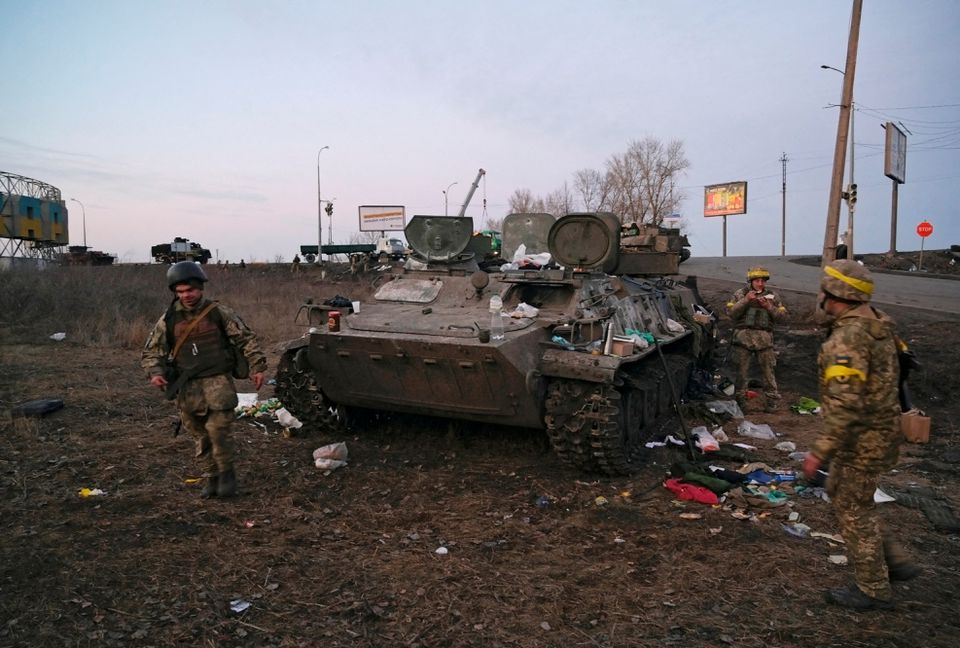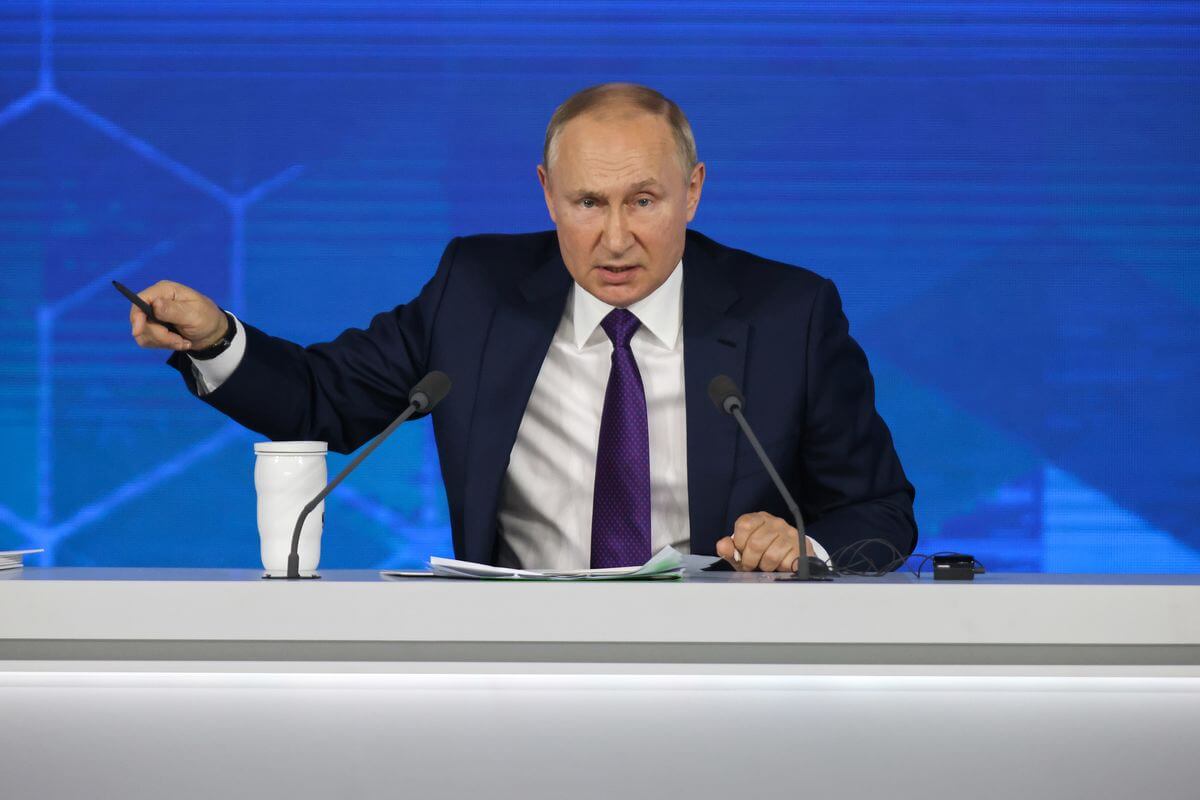In what is considered to be the largest attack on a European country since the Second World War, Russian military forces on Thursday launched a full-scale invasion of Ukraine from three sides—Belarus border in north, occupied Crimea in south, and Russia’s border with Ukraine—firing missiles at major Ukrainian cities, including its capital Kyiv, the second-largest city Kharkiv, the southern port cities of Odessa and Mariupol, and Dnipro. Furthermore, Russian forces seized the Chernobyl nuclear power plant on their way towards Kyiv.
According to the Washington Post, Russia used 75 bombers across Ukraine, targeting military warehouses and airfields.
"Putin is the aggressor. Putin chose this war. And now he and his country will bear the consequences." - President Joe Biden announces additional sanctions against Russia over its invasion of Ukraine: https://t.co/mWe3ZpHotI pic.twitter.com/ZqpGypalyl
— CNN (@CNN) February 24, 2022
Russian Defence Ministry spokesperson Igor Konashenkov told reporters that its military had successfully incapacitated 83 Ukrainian military facilities. They also shot down various Ukrainian military equipment that included four Sukhoi jets, four Bayraktar TB-2 drones, and one helicopter. It confirmed the capture of 14 Ukrainian soldiers, saying that their surrender is subject to an armistice agreement on the part of Kyiv. Russia also reported the death of 40 Ukrainian soldiers and 10 civilians.
The Ukrainian Defence Ministry confirmed that it had used the American Javelin anti-tank missiles to thwart 15 Russian T-72 tanks, in addition to neutralising six planes, two helicopters, and dozens of Russian vehicles. Additionally, Ukraine said it has killed 50 Russian soldiers and captured two more. The Defence Ministry highlighted that it has full control of the cities of Mariupol and Shchastia but underscored that the situation in Kharkiv looks very difficult with “fierce fights” underway. Both sides appear to be in the middle of an information war as they continuously dismiss each other’s military claims as false.
Ukrainian President Volodymyr Zelensky confirmed that 137 service members and civilians have been killed and 316 injured in Russia’s attack so far. He urged Ukrainians to take up arms in self-defence, and issued a decree mobilising the Ukrainian army in “defence of the state.”

During an address to Russians, President Vladimir Putin explained the situation in Ukraine extensively, emphasising that “it is not our plan to occupy the Ukrainian territory.” He said his rationale for conducting the military operation in Ukraine is rooted in the United States’ (US) failure to provide guarantees against the expansion of the North Atlantic Treaty Organization (NATO) towards Russia. Likewise, Putin accused Kyiv of conducting a “genocide” in Donbas, saying that Moscow’s ongoing mission is to protect these people. He made it clear that Russia will “demilitarise and denazify” Ukraine and hold the government accountable for its crimes.
In his address, Putin alleged that NATO countries have over the past 30 years constantly rejected Russia’s efforts to inculcate “principles of equal and indivisible security in Europe.” He said that NATO has “continued to expand despite our protests and concerns,” taking aim at the Alliance’s “cynical deception,” “lies,” and “attempts at pressure and blackmail.”
He further criticised NATO members’ ‘insolence,’ “contemptuousness,” and “disdainful attitude,” saying it has fuelled their self-perceived “exceptionalism, infallibility, and all-permissiveness.”
He then argued that the collapse of the Soviet Union led to “a kind of modern absolutism, coupled with the low cultural standards and arrogance of those who formulated and pushed through decisions that suited only themselves.” To illustrate his point, it pointed to the examples of Iraq, Libya, and Syria, which were characterized by disregard for international law and institutions and left behind “bloody non-healing wounds and the curse of international terrorism and extremism.”
Next, he said that he will not bow down to the “brash and never-ending blackmail” of the West’s sanctions regime. Crucially, he warned that Russia “remains one of the most powerful nuclear states” and that it has a “certain advantage in several cutting-edge weapons.” To this end, he declared, “There should be no doubt for anyone that any potential aggressor will face defeat and ominous consequences should it directly attack our country.” Later in his address, he once again said that anyone who “stands in our way” will face “consequences […] such as you have never seen in your entire history,” stressing that Russia is “ready,” before declaring, “I hope that my words will be heard.”
Putin also denounced the West for supporting “far-right nationalists and neo-Nazis” who will “never forgive the people of Crimea and Sevastopol for freely making a choice to reunite with Russia.” Keeping this in mind, he said that NATO’s eastward expansion is “becoming worse and more dangerous by the year” and that it would have been “irresponsible” for Russia to “stay idle and passively observe these developments.”
He reiterated that Russia has “accepted the new geopolitical reality” of the post-Soviet era and claimed that it has been respecting the sovereignty of all post-Soviet states. The Russian leader then referred to Article 51 of the UN Charter, which calls for collective self-defence to maintain international peace and security, noting that the invasion was necessary to protect those who have been “facing humiliation and genocide by the “Kyiv regime.”
Putin stressed that he has no plans to occupy Ukrainian territory or “impose anything on anyone by force.”
President Vladimir Putin threatened “consequences you have never faced in your history” for “anyone who tries to interfere with us.” His speech, intended to justify the invasion of Ukraine, seemed to come close to threatening nuclear war. https://t.co/98DJWNFYOo pic.twitter.com/AEUXpmJ2Uy
— The New York Times (@nytimes) February 24, 2022
On the same day as Putin’s address, Reuters reported that Russian police had arrested 1,667 anti-war protesters gathered across 53 cities to voice their opposition against Russia’s invasion of Ukraine; the Kremlin, however, dismissed these reports as “false information.”
US Defence Secretary Lloyd Austin spoke with various NATO and European allies to address Russia’s “unfounded and unprovoked war” against Ukraine. He confirmed that the US will bolster its troops in Europe, mobilising an additional 15,000 service members that will bring up the number of American troops in Europe to 90,000. Austin also spoke with his Ukrainian counterpart Oleksii Reznikov to reaffirm Washington’s support for Kyiv.

